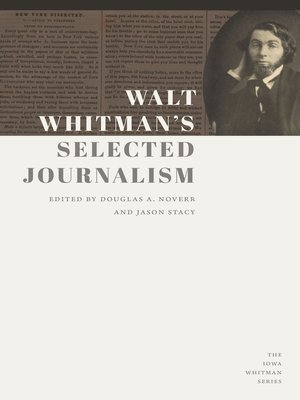
Sign up to save your library
With an OverDrive account, you can save your favorite libraries for at-a-glance information about availability. Find out more about OverDrive accounts.
Find this title in Libby, the library reading app by OverDrive.



Search for a digital library with this title
Title found at these libraries:
| Library Name | Distance |
|---|---|
| Loading... |
Long before he was a celebrated poet, Walt Whitman was a working journalist. By the time he published the first edition of Leaves of Grass in 1855, Whitman had edited three newspapers and published thousands of reviews, editorials, and human-interest stories in newspapers in and around New York City. Yet for decades, much of his journalism has been difficult to access or even find. For the first time, Walt Whitman's Selected Journalism thematically and chronologically organizes a compelling selection of Whitman's journalism from the late 1830s to the Civil War. It includes writings from the poet's first immersion into the burgeoning democratic culture of antebellum America to the war that transformed both the poet and the nation.
Walt Whitman's Selected Journalism covers Whitman's early years as a part-time editorialist and ambivalent schoolteacher between 1838 and 1841. After 1841, it follows his work as a dedicated full-time newspaperman and editor, most prominently at the New York Aurora and the Brooklyn Daily Eagle between 1842 and 1848. After 1848 and up to the Civil War, Whitman's journalism shows his slow transformation from daily newspaper editor to poet. This volume gathers journalism from throughout these early years in his career, focusing on reporting, reviews, and editorials on politics and democratic culture, the arts, and the social debates of his day. It also includes some of Whitman's best early reportage, in the form of the short, personal pieces he wrote that aimed to give his readers a sense of immediacy of experience as he guided them through various aspects of daily life in America's largest metropolis.
Over time, journalism's limitations pushed Whitman to seek another medium to capture and describe the world and the experience of America with words. In this light, today's readers of Whitman are doubly indebted to his career in journalism. In presenting Whitman-the-journalist in his own words here, and with useful context and annotations by renowned scholars, Walt Whitman's Selected Journalism illuminates for readers the future poet's earliest attempts to speak on behalf of and to the entire American republic.
Walt Whitman's Selected Journalism covers Whitman's early years as a part-time editorialist and ambivalent schoolteacher between 1838 and 1841. After 1841, it follows his work as a dedicated full-time newspaperman and editor, most prominently at the New York Aurora and the Brooklyn Daily Eagle between 1842 and 1848. After 1848 and up to the Civil War, Whitman's journalism shows his slow transformation from daily newspaper editor to poet. This volume gathers journalism from throughout these early years in his career, focusing on reporting, reviews, and editorials on politics and democratic culture, the arts, and the social debates of his day. It also includes some of Whitman's best early reportage, in the form of the short, personal pieces he wrote that aimed to give his readers a sense of immediacy of experience as he guided them through various aspects of daily life in America's largest metropolis.
Over time, journalism's limitations pushed Whitman to seek another medium to capture and describe the world and the experience of America with words. In this light, today's readers of Whitman are doubly indebted to his career in journalism. In presenting Whitman-the-journalist in his own words here, and with useful context and annotations by renowned scholars, Walt Whitman's Selected Journalism illuminates for readers the future poet's earliest attempts to speak on behalf of and to the entire American republic.







